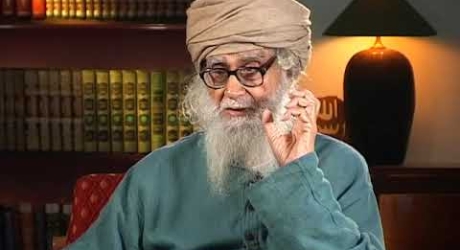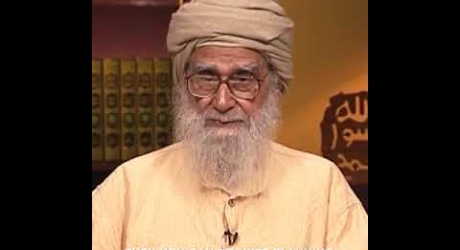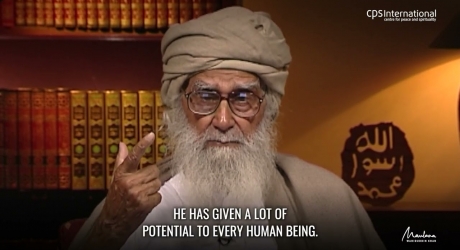Crisis management requires the presence of mind. It is the presence of the mind that helps one to manage crises successfully. The greatest quality needed for successful crisis management is only one: to forget the first chance you have lost and discover the second chance and avail of it. In every crisis, a person loses the first chance. One obsessed with losing the first chance cannot manage the crisis. The moment you get rid of the first loss, you can easily manage the problem in your favour. This principle applies not only to individuals but also to nations. A nation, too, often loses the first chance. At that time, national leaders should remove people’s focus from the first chance and draw their attention to the second chance. It is the only art of management of a crisis.
Introduction
Crisis (its Arabic equivalent being, Bohran) denotes a problem situation that arises in the life of everyone, be it an individual or a nation. The important question here is when crisis is faced at such a large scale, what is the way to deal with it. Those who are successful in dealing with crisis situation, are able to extricate themselves out of it, others re main engulfed.
What is crisis?
Crisis is a defined as an unstable situation of extreme difficulty, in other words, it is a complex problem. If the situation presents an ordinary degree of perplexity or difficulty, it presents a problem. Unlike an ordinary problem, solution of a crisis situation is difficult to fathom. For example, a person who wants to come to this floor will have to find the staircase and tread his way up. If instead of doing so, he creates a hue and cry, he has in effect, failed to manage the crisis situation.
Likewise, while driving through a narrow road, if the driver sees a car approaching from the opposite direction, he can opt for one of the two courses. The driver may choose to blow the horn and get into a verbal brawl with the other driver. Doing so, would lead them into a deadlock. If on the other hand, one of the two drivers lets the other car pass by, it will be an example of crisis management. Such situations presents itself before all – most often, individuals are able to solve it but communities and nations are not able to solve it.
The present-day Muslim community is stuck in crisis and they do not know how to manage it despite their being ample examples in the life history of the Prophet Muhammad.
Example from the life of Prophet Muhammad
According to a tradition, the Prophet and his Companions were travelling from Taif to Mecca. The total strength of people was 12,000 and mounted upon horses or on foot, the group reached a narrow valley, Az-zaiyyiqa. Upon reaching the place, they halted to think how it will be crossed. The Prophet advised that since their current formation was horizontally spread, they were finding it difficult to think of how to cross the narrow valley. If however, they were to form themselves vertically, they would be able to manage and pass through. This is an example of crisis management, which depicts man’s response to a new situation by way of re-assessing and re-thinking.
It must be understood that in situations of crisis, pre-crisis thinking does not work. Unless man develops post-crisis thinking, he will not be able to manage the situation.
When the Prophet Muhammad began preaching the Word of God, the Meccans were staunch idol worshippers. Some of them agreed to Prophet’s message and some did not. Despite dire efforts, his opponents in Mecca could not halt the mission of the Prophet. Given its momentum, the Meccan tribal Parliament decided to kill the Prophet. When the Prophet got to know about this, he had two courses of options – one was that he could have mobilized his companions to fight against the tribal Meccans to get back their rights as Mecca was their homeland. Had he opted for this course, all would have perished. But Prophet re-thought, re-assessed and applied post-crisis thinking. He decided to migrate to Medina, which is about 300 miles away and started doing his work there.
Similarly, when the Prophet and his companions set out to Mecca to perform Umrah, their opponents in Mecca halted them mid-way at Hudaibiyaah and did not allow them to enter Mecca. Here also, Prophet had the option of violent confrontation. But he chose the method of peaceful negotiation instead. These talks continued for about two weeks and resulted in the signing of a ten year no-war pact. In order for this peace Treaty to materialize, the Prophet unilaterally agreed to all terms and conditions laid by the Quraysh. In this instance, lies a clear example of crisis management. As a result of the Treaty, when the opportunities opened up, the activities of the mission caught speed.
Failure of Muslim to manage the crisis
The present-day Muslim mindset is infested with the thought that the world is conspiring against them. They do not understand that their real problem is that they failed to manage crisis.
Islam began in 610 A.D in Mecca and spread to most parts of Africa and Asia by 632 A.D. A Muslim empire came into existence as Muslims overthrew the tyrannies of Roman and Sassanid empires.
After abeout 800 years, Europeans overthrew the Muslim Empire leading to the establishment of the British Empire. The changed situation demanded a change in thinking but Muslims failed to adopt it.
In the year 1799 when the British defeated Tipu Sultan at Srirangapatnam, their General remarked, “Now India is ours!” After this decisive victory, British rule flourished in India in a big manner. In the same year, the French armies destroyed the Turkish Naval fleet which took Turkish Empire by storm.
Due to this and several other events in the background, Muslims started hating the Europeans instead of thinking about the reason for European dominance.
The rise of British can be attributed to modern technology and modern science. It was not a case of Muslim enmity but a case of technological supremacy. However, all Muslim thinkers took it to be the case of enmity against the Muslim world. They did not realize that Muslims had traditional knowledge whereas British came with scientific knowledge. Muslims had animal power and used ancient warfare techniques but British brought with them mechanical power and modern warfare technology. The difference was clearly on qualitative grounds since quantity no longer enjoyed supremacy.
The present-day Muslim mindset continues to be anachronistic. They did not make an effort to understand the technological prowess of the world. Instead of succeeding them in a level playing field, Muslims resorted to suicide bombing so that they can destabilize the “anti-Muslim” powers. All this while the Muslim clerics maintained silence; none of them gave a fatwa against suicide bombing.
In such situations of extreme violence, a new ijtihad was required, which has been described in the Quran as a law of nature:
We bring these days to men by turns, so that God may know those who believe, and choose witnesses from among you (3:140)
In the light of the above verse, Muslims should have realized that political supremacy is not a monopoly of anyone. In other words, the concept of “Empire” is no longer feasible in the modern world. Despite that, there still exist over 50 Muslim countries worldwide. This change in the new world was brought about after the French Revolution in the 18th century, which led to the prevalence of the idea of nation-state. This Revolution brought about democracy and the idea of “empire -hood” was discarded. Unfortunately, the present-day Muslims are still living in the “Empire” mindset and continue to make efforts to regain the old glory.
At this stage, an ijtihad (re-thinking) was required so that Muslims can be brought to terms with the reality and are able to understand that the era of empires is over. All Empires, be it the Roman, Muslim, British, Russian, came to an end. In the present times, America rose with the desire of establishing an empire but soon this approach proved resultless.
Muslims however continue to live in the idea of “caliphate” and therefore crisis continues to perpetrate throughout the Muslim world. They still have not come to terms with the reality of the present world. Here I will give two illustrative examples from history.
The example of China
The old concept of Communism flourished in China according to which political power and economic activities worked best when integrated, centrally.
Deng Xioping, the Chairman of Communist Party became instrumental in leading China towards a market-based economy.
Xioping was educated in China and Russia and later went to Paris where he realized that the reason for development of economy of France was the decentralization of economy from politics. This gave him the idea to accelerate the economic development of China. China adopted the French model and while the political rule continued to be in the hands of the Communist Party, the economy was liberalized. This change brought about great progress in China and today even America is indebted to China.
The concept of liberalization was adopted in India as well but we could not completely de -link politics and economy. That is why, corruption thrives in India. The pre-independence leaders of India were of a socialist bent of mind and wanted to create a socialist economy in India. They adopted the method of controlled economy which gave bureaucracy the right to control economic activities. The license- raj paved way for bureaucrats to take bribe for giving the authorization. This situation has deteriorated to such an extent that the only available solution for controlling corruption in India is to follow the Chinese model and exercise de-linking between politics and economy.
The crisis manage ment practiced by China is exemplary. It was earlier said that a dead civilization cannot be revived but China changed this belief. From being a great centre of civilizational progress to becoming a dead civilization, China revived itself once again. The present-day Muslims can also revive themselves by learning the art of crisis management from China’s example.
The example of Pope
The authority of Pope was highly influential in ancient Europe. However, the ideas that emerged from scientific advancement were directly confrontation with the Christian beliefs. For instance, the Christian belief lent credence to the geocentric theory (Earth is the centre of the universe and all objects orbit around it). Astronomical discoveries proved the contrary and established that the universe followed the heliocentric model (Sun being the central body of the solar system and Earth and other planets revolve around it). The details of this have been provided in the book by John William Draper, “History of the conflict between religion and science.”
When such conflicting accounts emerged, the Christian church receded. They re-thought and decided to de-link their authority. An agreement called the Lateran Treaty was signed in the year 1929, between the Kingdom of Italy (represented by Benito Mussolini) and the Holy See (Pietro Gasparri, Cardinal Secretary of State). This was a political treaty, which recognised the full sovereignty of the Holy See in the State of Vatican City, which was thereby established. Vatican became an independent state. This agreement saved the title, “Pope” and with it, its historical sanctity got preserved. Even today, the Pope is greatly revered. Hence, the religious unity remained intact.
Ill-effects of confrontation
A clear case of the repercussions of confrontation can be seen in the example of Khalifa-tul-Muslimeen, a coveted title of Turkey, which lost its influence when the Khalifa took up to confrontational course of action. Had this title remained, it would have been a great source of unity.
Similarly, if Arabs would have agreed to the Balfour Agreement, they would have had a stronghold in the area because in dividing the land between Arabs and Israel, Balfour had allocated the better half to Arabs. Likewise, if the Kashmiris would have refrained from militancy, it would have developed like Switzerland.
In this way, Muslims miserably failed in the art of crisis management and suicide bombing is the final act of failure aimed at creating de-stabilisation. All these movements that perpetrated hatred and revenge have proved futile in terms of result – the only criterion to judge the success of a movement.
It must therefore be borne in mind that in face of a new situation, planning must be done and efforts made so that the crisis can be managed. According to the Quran, Reconciliation is best (4:128)
This verse means that when a situation emerges, it should be managed and not confronted with. For example, when two cars head towards each other from opposite directions, they have two options – either to honk, blow the horn and abuse one another or one car gives a pass to the other and they both peacefully head in their respective directions.
Confrontation increases the chaos whereas managing helps deal with deadlock so that a new level playing field can be arranged for working peacefully. Had Prophet fought at Hudaibiyaah, that place would have become a graveyard of Muslims but when managed, Hudaibiyaah became the starting point of a new era.
Conclusion
Problems are a part of the Creation Plan of God. They must be taken as a challenge and managed; when this does not happen, it becomes a deadlock situation. But man’s mind has such immense capacity that it can re-assess and re-plan the approach from any point.
The present-day Muslims failed to analyse the crisis and re-plan their approach; instead the Muslim literature only propagated complaints. They could not understand that complaining in event of a problem situation does not help. Such a situation requires ijtihad (re-thinking). Unfortunately, the Muslim clerics treat this approach as a taboo. According to a Hadith, a Mujtahid (one who applies re- thinking) gets double reward for a right ijtihad and single reward for a wrong ijtihaad.
This Hadith points out to an important law of nature. If man’s thinking becomes stagnant, it closes all doors to progress. Those clerics who claim that ijtihad is no longer applicable are making a self-styled claim, which has no basis in the Quran or Hadith. Creativity is a continuous work but because this wisdom lacked the Muslim minds, they could not understand the contemporary world. Muslims need to re-assess their approach. They must understand that praying loudly on speakers is not the solution because dua is not an institution.
Dua is an individual action and not community work. According to a Hadith, when in his loneliness, man thinks about God, paradise, death and hell and tears trickle down his eyes, he will receive God’s protection. Such is real dua. (Mishkat)
A crisis situation must therefore be first be fully understood. Until this is done, no new course can be adopted. The life of Prophet Muhammad is filled with crisis management situations. Unless the Muslims admit that they were wrong in the last two hundred years, they will not be able to make a new beginning. Patching up for their mistakes and not admitting will not help. Muslims could not positively avail opportunities like the printing press, democracy, openness and remained reactive.
World is reaching its end. Now, more than ever it is critical that Muslims confess that they were wrong. Instead of complaining and blaming others, Muslims will have to blame themselves so that they can re-plan their course of action. May God give us the wisdom to realize and re-assess our approach!
Question – Answers
Q1: Why is it that Muslims are different from other communities in failing to find a solution to their
problems?
A: The present-day Muslim psyche has developed a result of the failure of the Muslim leaders. But this is not the only reason. An immediate question that comes to mind is why did the Muslim leaders fail? This happened because these leaders were marred by hatred. For example, during the Abbasid period, news spread that a regional tribe is about to revolt. The ruler was being advised to send an army to subdue the anticipated uprising but a courtier advised the King that there was no need to do so. He said that the notion of their King’ s dominance was so strong that even a warning letter from his administration would suffice to check their courage. His assessment was correct. A letter was sent and it successfully checked the revolt. This mindset of dominance has continued to prevail in Muslims because in all these years, no creative leader came about who could guide the Muslims.
Q2: Satan has attached a sense of thrill with acts of sin be it consuming alcohol or whatever. How does Satan beautify the bad things?
A: According to the Quran,
Shall lead them astray and fill them with vain desires (4:119)
The most vulnerable point of man is his unlimited desires. Man must keep evaluating the outcome of following his desires. Only by doing this can he keep his mind activated to counter the allurements of Satan.
Q3: Why is ijtihaad (re-thinking) considered a taboo by Muslims? What is its history?
A: Ijtihaad is considered a taboo by Muslims today because they hold the notion that the last set of people who could undertake ijtihad were the teachers of Fiqh (Jurisprudence) in the Abbasid period. Anyone who wants to understand this in detail can refer to my book, Fikr ki glati where I have elaborated this in detail.
Q4: People think that if kids do hifz (memorise the Quran), the parents shall dwell into paradise?
A: This is a self-styled belief of the Muslims because no where is it cited in the Quran or Hadith. The memorization of the Quran was done in order to preserve it; it was not meant for taking man to paradise. In earlier times, Hafiz preserved Quran in their memories, now the printing press does. It must be understood that the sole condition for paradise is - ikhlaas.
Q5: Some people think that Ijtihaad can lead to innovation. Please comment.
A: There is only one condition of performing ijtihaad and that is, intent of the doer. If man does it for the sake of God alone, then even if he makes a mistake, he will be rewarded by God.
Q6: As far as the solution for Palestine issue is concerned, I agree that Muslims must establish status-quo and establish peace. But you wrote in Prophet of Peace that the exiled Jews have the right to return to the Holy Land. Does this Quranic verse not pertain to the contemporaries of Moses’ only?
A: A principle of the Quran is applicable to a select group if it is explicitly stated in the Quran that it only applies to them and to no one else. But in the context of above verse, the Quran does not say that it is applicable to the contemporary of Moses’ a lone. We know from the Quran that Abraham had two sons – Ismail (who was settled in Hijaz) and Issac (who was settled in Palestine). That is why, Israel became the assigned land for the Jews.
Q7: Why have Muslims not emerged from the empire mindset?
A: The blame for the present Muslim mindset goes to the so-called Muslim leaders. In this era, without any exception, every person speaks the language of political pride and superiority. That is why I say that the Islam of present-day Muslims is derived from history and not scriptures. Till this continues, things will not change. History (or empire) should be taken as a temporary phase of Muslim history and Muslims must now revert to the Quran and Hadith.
Q8: According to a Hadith, reading a word of the Quran is rewardable. What does this mean?
A: It does not mean that the reward is for rendering those letters but for the spirit attached with it. This is a way of saying that you say with reference of words but it pertains to the spirit.
Q9: Media is a perception forming industry. How should a common man untangle the complex web of perceptions that is built around by media?
A: The only way to untangle the web is to blame the Muslims. The biggest mistake of present-day Muslims is that they blame the media for all their ills. Media is an industry which sensationalizes items of news and Muslims must understand this.
Q10: Today Muslims are looked upon as terrorist. In this context, how can we apply the art of crisis management?
A: No one calls me a terrorist. Those who do suicide bombing or commit acts of terror are called so. But despite these open acts of terror, no clerics openly denounces this practice.
Q11: You have used a psychological term, “balanced personality” in your book, Prophet for all Humanity. What does this mean?
A: It means maintaining the personality which has been given to you by nature. But when, you get affected by external influences, it corrupts the personality.
Q12: Some people discouraging from thinking say, Islam does not stand on thinking?
A: Quran keeps referring to usage of your ability to think, again and again. He who stops is the one who should rectify his thinking.











